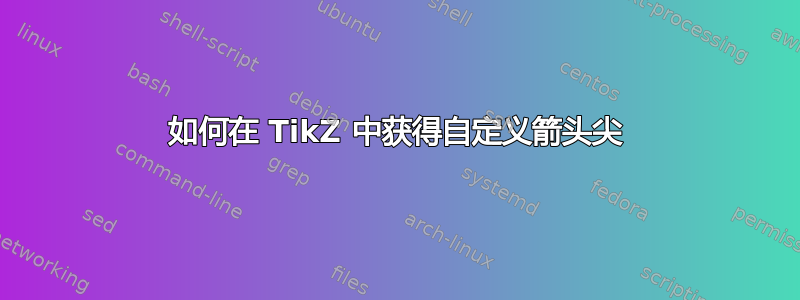
我想知道是否有可能获得确切地以下箭头提示带有TikZ-PGF? 我已经在 PGF 手册和此站点中搜索了所有可能的解决方案,但只有近似的解决方案可用。以下是不同大小和方向的一些快照:



中间的图片提供了最准确的形状。
我需要详细信息。八在我的例子中,构成箭头凸包的点,而不是中的四个点,例如,stealth或中的三个点latex。
以下是所需的详细信息(当然,我有些夸张以突出小细节):

非常感谢您的任何建议。
答案1
stealth好吧,我设法解决了这个问题。在我找到内置箭头的代码后,这很容易。这个想法很简单,就是将我的情况中的额外点(即点 3、4、6 和 7)添加到原始代码中stealth。添加所需的点后,需要进行一些调整才能获得我想要的形状。
现在这是我为此构建的代码:
\pgfarrowsdeclare{varstealth}{varstealth}
{
\pgfarrowsleftextend{-5.59\pgflinewidth}
\pgfarrowsrightextend{4.5\pgflinewidth}}
{
\pgfpathmoveto{\pgfpoint{4.5\pgflinewidth}{0pt}} %Point5
\pgfpathlineto{\pgfpoint{-0.63\pgflinewidth}{1.09\pgflinewidth}} %Point4
\pgfpathlineto{\pgfpoint{-5.48\pgflinewidth}{3.06\pgflinewidth}} %Point3
\pgfpathlineto{\pgfpoint{-5.59\pgflinewidth}{3.0\pgflinewidth}}%Point2
\pgfpathlineto{\pgfpoint{-3.95\pgflinewidth}{0pt}} %Point1
\pgfpathlineto{\pgfpoint{-5.59\pgflinewidth}{-3.0\pgflinewidth}}%Point8
\pgfpathlineto{\pgfpoint{-5.48\pgflinewidth}{-3.06\pgflinewidth}}%Point7
\pgfpathlineto{\pgfpoint{-0.63\pgflinewidth}{-1.09\pgflinewidth}}%Point6
\pgfusepathqfill
}
我也尝试过使用它,如下面的例子所示(最初发现这里):

以下是此情况的代码:
\documentclass[a4paper]{article}
\usepackage{tikz}
\usetikzlibrary{arrows,positioning}
\usetikzlibrary{backgrounds}
\begin{document}
\pgfarrowsdeclare{varstealth}{varstealth}% My new arrow tip declaration
{
\pgfarrowsleftextend{-5.58\pgflinewidth}
\pgfarrowsrightextend{4.5\pgflinewidth}}
{
\pgfpathmoveto{\pgfpoint{4.5\pgflinewidth}{0pt}} %Point5
\pgfpathlineto{\pgfpoint{-0.63\pgflinewidth}{1.09\pgflinewidth}} %Point4
\pgfpathlineto{\pgfpoint{-5.48\pgflinewidth}{3.06\pgflinewidth}} %Point3
\pgfpathlineto{\pgfpoint{-5.59\pgflinewidth}{3.0\pgflinewidth}}%Point2
\pgfpathlineto{\pgfpoint{-3.95\pgflinewidth}{0pt}} %Point1
\pgfpathlineto{\pgfpoint{-5.59\pgflinewidth}{-3.0\pgflinewidth}}%Point8
\pgfpathlineto{\pgfpoint{-5.48\pgflinewidth}{-3.06\pgflinewidth}}%Point7
\pgfpathlineto{\pgfpoint{-0.63\pgflinewidth}{-1.09\pgflinewidth}}%Point6
\pgfusepathqfill
}
\begin{tikzpicture}[>=varstealth,line width= 1pt,node distance=1cm, auto, description/.style={fill=white,inner sep=2pt},punkt/.style={rectangle,rounded corners,draw=black, very thick,text width=6.5em,minimum height=3.5em,text centered}]
%nodes
\node[punkt] (Banks) {Banks ($B_b$)};
\node[left=4cm of Banks] (dummy1) {};
\node[right=4cm of Banks] (dummy2) {};
\node[punkt, above=4cm of dummy1] (CB) {CB};
\node[punkt, below=4cm of dummy1] (Gov) {Government};
\node[punkt, above=4cm of dummy2] (Firms) {Firms ($F_f$)};
\node[punkt, below=4cm of dummy2] (HH) {HH ($HH_{hh}$)};
\path[->]
(Gov.20) edge[] node[below, rotate=48] {\small Bonds} (Banks.220)
(Banks.200) edge[] node[above, rotate=48] {\small Deposits} (Gov.40)
(Firms.250) edge[] node[above, rotate=90] {\small wage, dividends} (HH.110)
(HH.70) edge[] node[below, rotate=90] {\small equity, consumption} (Firms.290)
(Gov.350) edge[] node[below] {\small unempl. benefit} (HH.190)
(HH.170) edge[] node[above] {\small Taxes} (Gov.10)
(CB.325) edge[] node[fill=white,below, sloped] {\small interest, OSDF} (Banks.160)
(Banks.143) edge[] node[fill=white,above, sloped] {\small interest, IDL, OMO, OSLF} (CB.345)
(Firms.200) edge[] node[above, rotate=48] {\small principal/interest payments} (Banks.40)
(Banks.20) edge[] node[below, rotate=48] {\small Loans, interest} (Firms.220)
(HH.143) edge[] node[above, rotate=-50] {\small equity} (Banks.345)
(Banks.325) edge[] node[below, rotate=-50] {\small interest, dividends} (HH.160)
(Banks.west) edge[out=200, in=340, looseness=5] node[below] {\small interbank loans} (Banks.east);
\begin{scope}[on background layer] %new code
\path[->, thick](Firms.170) edge[bend right=35]node[above, near end, rotate=60] {\small Taxes} (Gov.120);
\end{scope}
\end{tikzpicture}
\end{document}


